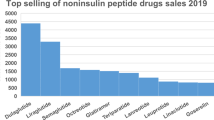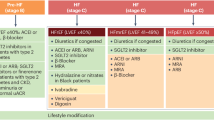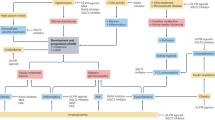Abstract
DIGESTION of human, ox and horse plasma or digestion for 5 hr. at 37° C. of hypertensinogen (alpha-2 globulin) at pH 2.5–3.5 with crystallized pepsin (50 mgm. per litre) leads to the liberation of several peptides. These substances have been shown to have similar pharmacological effects to those produced by neurohypophysial extracts. Croxatto and Croxatto1 have demonstrated that digestion of hypertensinogen with pepsin produces, under certain conditions, pepsitensin. The latter substance behaves similarly to hypertensin with regard to the action of proteolytic enzymes and tissue extracts.
This is a preview of subscription content, access via your institution
Access options
Subscribe to this journal
Receive 51 print issues and online access
$199.00 per year
only $3.90 per issue
Buy this article
- Purchase on Springer Link
- Instant access to full article PDF
Prices may be subject to local taxes which are calculated during checkout
Similar content being viewed by others
References
Croxatto, H., and Croxatto, R., Science, 95, 101 (1942).
Croxatto, H., Almeyda, M., and Barnafi, L. (unpublished observations).
Croxatto, H., Rev. Med. Aliment., 5, 9 (1943).
Croxatto, H., Rojas, G., and Barnafi, L., Acta Physiol. Lat.-Amer., 1, 178 (1951).
Author information
Authors and Affiliations
Rights and permissions
About this article
Cite this article
CROXATTO, H., BARNAFI, L., ROJAS, G. et al. Anti-diuretic and Oxytocic Substances liberated by the Digestion of Plasmatic Proteins with Pepsin. Nature 171, 82–83 (1953). https://doi.org/10.1038/171082a0
Issue Date:
DOI: https://doi.org/10.1038/171082a0
This article is cited by
-
�ber ein die glatte Muskulatur erregendes Polypeptid aus Schweineovarien
Die Naturwissenschaften (1957)
-
Untersuchungen über Pepsitensin
Zeitschrift für Die Gesamte Experimentelle Medizin (1956)
Comments
By submitting a comment you agree to abide by our Terms and Community Guidelines. If you find something abusive or that does not comply with our terms or guidelines please flag it as inappropriate.



